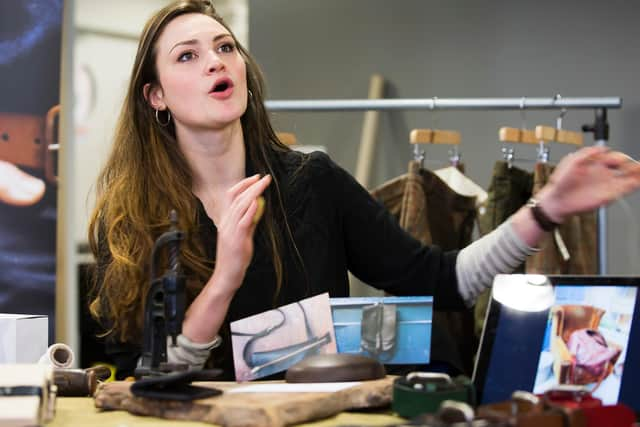'My sector didn't have a voice' - Call for fashion to be supported as much as fishing through Brexit and coronavirus
And now, hundreds of years on, producers are attempting to recapture that spirit to reinvigorate fashion, starting in Yorkshire, with a focus on sustainability.
The North has become a hotbed for the headquarters of fast fashion brands, from Boohoo, to In the Style, to Missguided.
Advertisement
Hide AdAdvertisement
Hide AdAnd the chairman of a Commons committee examining the impact of fast fashion on the environment and working conditions of staff said the North and the Midlands were also where the majority of processing and production of garments took place too.


However experts say now is a “pivotal time” for fashion, and that with Government support Yorkshire, the North, and the UK can restore its proud reputation for producing some of the world’s best quality garments.
The Centre for Retail Research (CRR) found that nearly 180,000 retail jobs were lost in the UK in 2020 as the coronavirus lockdowns took hold, and it predicts a further 200,000 will go in 2021.
But this is combined with soaring sales for online retailers, prompting calls for support and reframing.
Advertisement
Hide AdAdvertisement
Hide AdTamara Cincik founder and chief executive of the apolitical Fashion Roundtable think tank, said it was time for ministers to show the same amount of support for fashion as they have for sectors such as fishing and film.


“My sector didn't really have a voice,” said Ms Cincik, who previously worked for Labour MP Sharon Hodgson and has been in the fashion industry for 20 years.
Pointing to the film industry, she said Government support had helped the sector flourish, with film studios built in Reading and Dagenham.
And she said with Brexit and coronavirus both having had a big impact on the sector, now was the time for the industry to speak out.
Advertisement
Hide AdAdvertisement
Hide Ad“I think that's been the problem historically with the sector, it either hasn't engaged or it's just told them [ministers] what they think they want to hear. And ultimately, that is not going to lead you towards getting taxation support and incentives to produce here, it won't,” Ms Cincik said.


“The film industry kicked back, fishing’s kicked back fishing and got £23m out of the UK Government in January to support exports, it makes a fraction of the money [that fashion does].”
According to the Office for National Statistics, fishing was worth £437m to the UK economy in terms of GDP in 2019, while fashion came in at £35bn.
And Ms Cincik added: “This is a fantastic industry but it will be on its knees very soon.”
Advertisement
Hide AdAdvertisement
Hide AdCatherine West, Labour MP for Hornsey and Wood Green, is the chair of the All-Party Parliamentary Group for Ethics and Sustainability in Fashion, and said it was time the Government took the issue seriously.
“It’s not good enough to just say we’ll start making Topshop jeans in Wakefield,” she said. “Especially for small brands they need a lot of support through the Brexit bureaucracy, there’s still quite a lot of help that needs to be brought in for the small business industry.”
Ruby Creagh, who makes sustainable hand stitched leather bags and accessories from her Hebden Bridge studio, said support for small businesses was the biggest hurdle.
“I feel like it's very hard to be self employed, and they don't nurture people who are,” she said.
Advertisement
Hide AdAdvertisement
Hide Ad“It can suffocate people, and then often in school, nobody is really taught about being self employed in school, that would be really good to just encourage people to start their own little thing, really.”
She added: “But when you're starting something, and you want to be sustainable, it'd be really good if there was more grants for people to do things like that because it is a lot of money to put into something and it's very difficult to start up something like that, it’s near impossible.”
Ms Creagh said she had worked multiple jobs to pull together funding to start her venture but added: “It'd be good if there were some schemes out there for starting up sustainable brands.”
Part of the issue, Ms Cincik said, was that no one Government department wished to take responsibility for fashion, and she suspected it may be down to a “machismo” about which industries were important.
Advertisement
Hide AdAdvertisement
Hide Ad“I'm emailing someone going, ‘I'm actually not sure if it's your department or another department’. I would love to see a minister that was purely responsible for that.
“I think that if we were going to re-evolve the civil service, it would not be in the way that Dominic Cummings might like, but it would be sector led. So one minister per sector, really addressing that, because at the moment fashion sits between several departments. If it's sustainability, it's Defra [Department for Environment, Food and Rural Affairs]. If it's trade, it's over here. And I don't know that that works.”
Ms West echoed this and added: “I don’t think the Government really understands the potential, but I also don’t think the industry has a voice.”
The fallout from Brexit prompted Fashion Roundtable to write to the Government in February asking for more help.
Advertisement
Hide AdAdvertisement
Hide AdIn a reply Culture Secretary Oliver Dowden and Small Businesses, Consumers, and Labour Markets Minister Paul Scully told Ms Cincik at the time that “the UK’s offer to fashion professionals is significantly more generous than many EU Member States”.
But Ms Cincik said: “The Brexit conversation underpins everything.
“The work we do actually outlines two or three strategies, which really are up to [the UK] Government, not up to EU.”
“The VAT retail export scheme is not up to the EU, that's a UK only decision. The decision not to have garment workers on the shortage occupation list, is a UK decision.
Advertisement
Hide AdAdvertisement
Hide Ad“I am really worried from the conversations we're having with policy leaders in the modern slavery space, that Brexit is a massive opportunity for trafficking into those lower paid jobs.”
And she added: “There's been so many challenges for businesses trying to import and export from the EU since Brexit and it's been really challenging for them.
“Make it British say they've had a 63 per cent increase in the last few months of people wanting to produce here. But we need the infrastructure to support them. That fact that first of all, let's start with the workers. They're not on the shortage occupation list. We're not training them.
“I think the Government needs to understand that to get the vision for what they can do, they're gonna have to tackle the challenges of the Brexit conversation and support for micro businesses. And then we can get to the larger pieces about innovation and circularity.”
Advertisement
Hide AdAdvertisement
Hide AdMs West added: “As policymakers we should be thinking about the now because we know that coronavirus is basically going to cripple the industry, so I think having a big shift now is necessary. But it’s trying to do it at the same time as getting over coronavirus, I think that adjustment could be very painful.”
She urged the Government to take a two pronged approach to supporting development at home while also looking at European trade.
“The Government’s got to keep the trade with Europe going at the same time as supporting, in any way it can, the indiginous industry, so that you’ve almost got a parallel track.”
Ms Cincik said: “Pre the Covid lockdown, they were growing at 11 per cent, the creative industries, just massive. I think the car industry would dream of those figures.
Advertisement
Hide AdAdvertisement
Hide Ad“So what are we saying about the work of women and the work of people who are not in butch macho jobs? What are we saying about those two things? Because actually, they're not the jobs of the future. and I think all the parties need to understand that if they really want to understand the jobs of the future, they are not necessarily aviation, automobiles and fishing.”
Already much of the industry was “tech savvy” and ready for the digital revolution, while Ms Cincik said the whole sector worked in psychology and predicting trends and behaviour.
“I think that the Government needs to understand that we're already ahead on so many of these issues, and stop looking after 19th century macho jobs at the cost of the 21st century. Because if you want to build back better, you absolutely need to get what that really means.”
She added: “And sustainability with COP26, and the G7 leadership, I would imagine is what the Government wants to see that the Build Back Green agenda should be run through every piece of policy, and that includes support for the fashion industry.”
Advertisement
Hide AdAdvertisement
Hide AdA Government spokesperson said: “We want to see a more prosperous and sustainable fashion industry as we build back better, harness the opportunities of Brexit and strive towards a greener planet.
“The Government has put in place a comprehensive £352bn Covid-19 support package for businesses and individuals, with ministers regularly engaging with the sector, and we are also committed to tackling labour exploitation and improving transparency in supply chains.